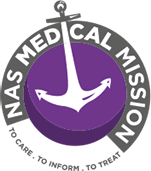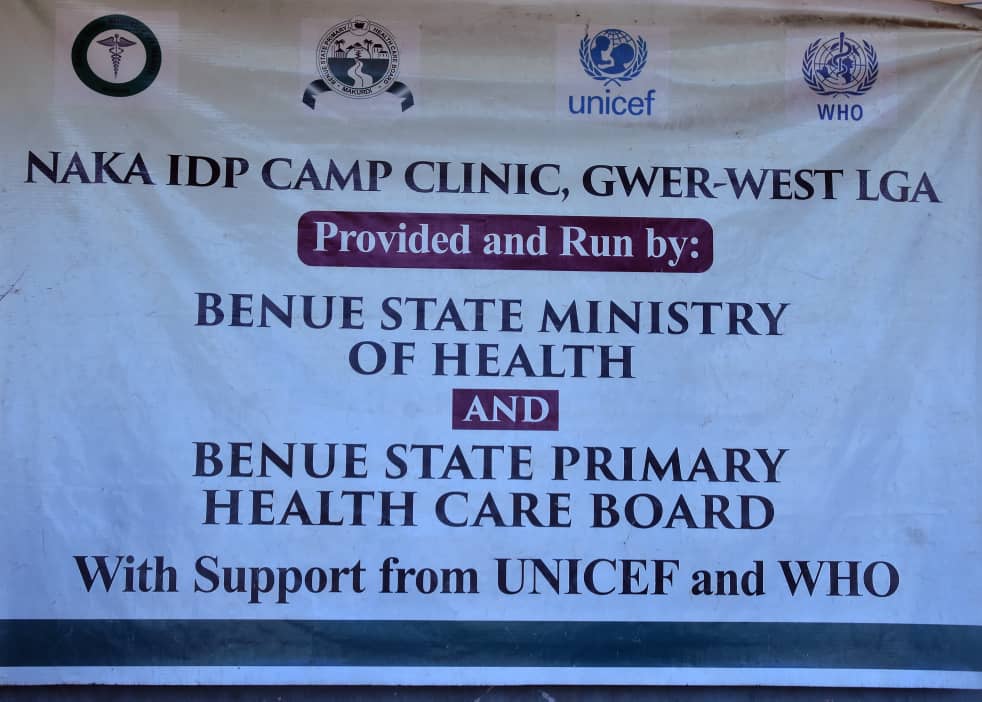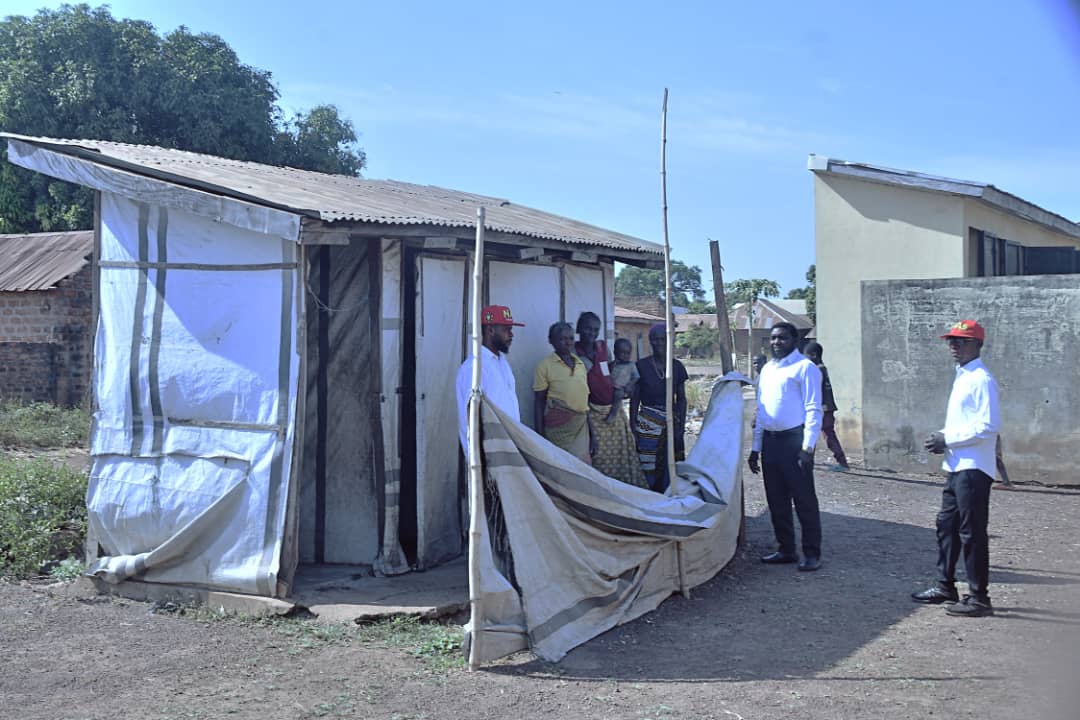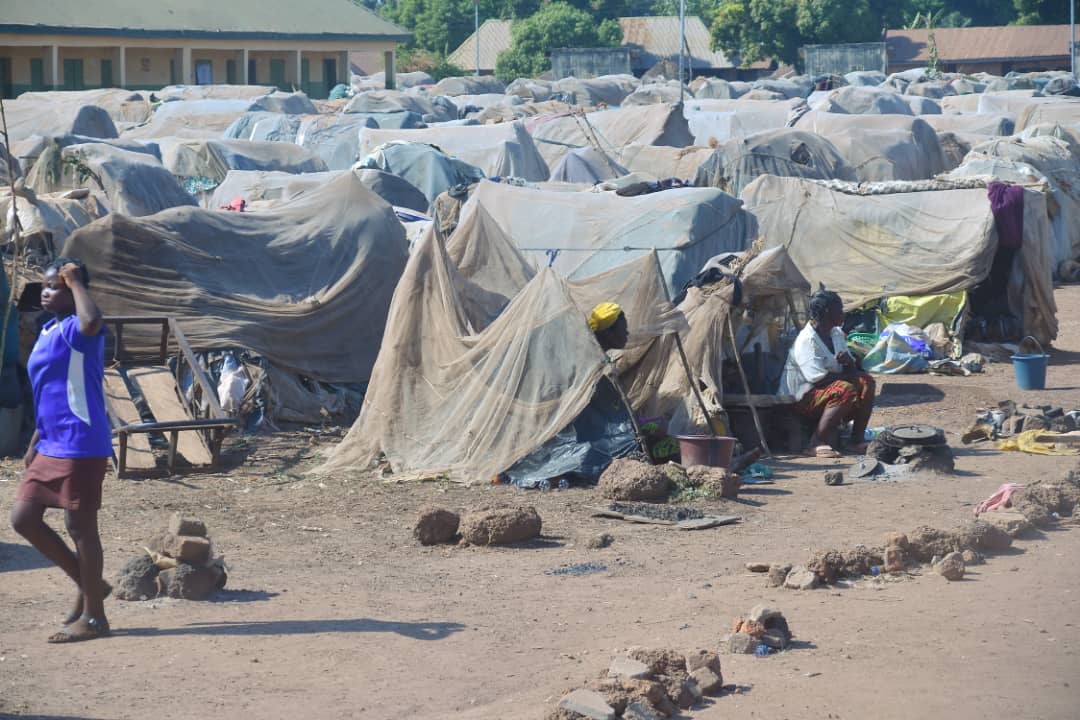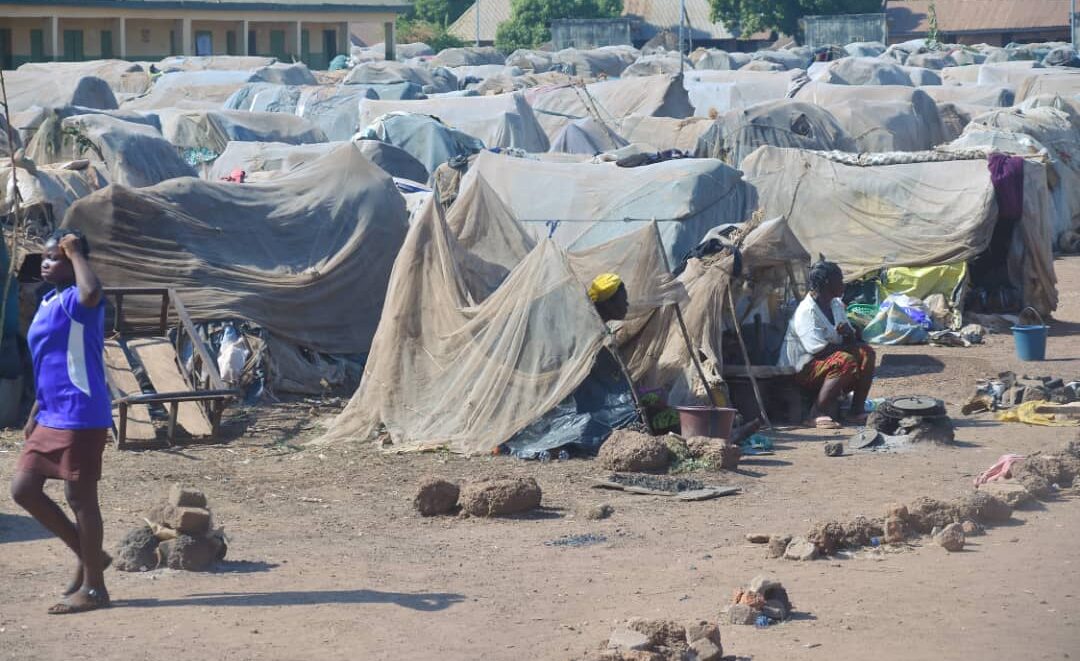
Executive Summary:
This needs assessment report aims at reporting information gathered and insights gained during a fact-finding mission by a dispatch team from Rima deck to the Naka IDP Camp towards executing a medical outreach programme targeted at the internally displaced persons residing within the Naka IDP camp in Benue state. Rima deck covering Benue, Nasarawa, and some parts of Taraba has been the epicentre of a complex ethno-religious and Farmer-Herder conflict. In Benue state alone, this conflict, which has been ongoing for over two decades, has displaced over 1,000,000, cutting across 6 out of the 23 Local Government Areas of Benue state. The scale of the crisis overwhelms the Benue State Government. As a result, many IDP camps are faced with inadequate basic amenities, proper health facilities, access to portable water, poor feeding conditions, poor toilet facilities and improper sewage disposal, poor shelter provision and lack of toiletries (soap, pad, detergent) amongst others.
The prevalent diseases, maternal and child health issues reported at the Naka IDP Camp include the following Hepatitis B and hepatitis C viral infections, diabetes, respiratory tract infections, malaria, acute diarrhoeal disease, dermatological diseases, HIV and other sexually transmitted diseases, typhoid fever, peptic ulcer disease and hypertension.
This medical outreach initiative will specifically address the health crisis faced by the IDP population, with a particular focus on providing free medical consultations and diagnosis of the identified prevalent diseases. Basic management of some disease entities will be carried out with referral and follow-up where necessary.
Rima Deck aims to begin this initiative at the Naka IDP camp, which is one of the 22 official IDP camps in Benue State, but with the intention to scale up this medical outreach programme to other IDP camps located in Nasarawa and Taraba states. We envision expanding this medical outreach to cover other IDP camps in Benue, Nasarawa, and Taraba states.
Background:
Rima Deck (the Benue, Nasarawa and Taraba Chapter) has initiated the Internally Displaced Persons Medical Outreach Programme, which addresses IDPs’ basic medical needs in the Benue Valley. This needs assessment report provides the Chapter with the relevant information and insights gained during a fact-finding scoping mission at the IDP camp. The aim is to provide critical medical services to IDPs, particularly in diagnosing Hepatitis B and Hepatitis C viral infections, diabetes, respiratory tract infections, malaria, acute diarrhoeal disease, skin infections, gastro-enteropathies like gastritis and peptic ulcer disease, and sexually transmitted diseases like HIV/AIDS.
Benue and Nasarawa States account for over 1.5 million internally displaced persons (IDPs), because of the ongoing Fulani herdsmen-farmers conflict (Africanews, 2022). This has made these states the epicentre of displacement in the Middle Belt region. Unfortunately, these IDPs and affected communities have not received the necessary assistance for recovery or integration. Moreover, Benue and Nasarawa States were excluded from Nigeria’s humanitarian response plans between 2015 and 2023 (OCHA, 2015–2023).
Médecins Sans Frontières (MSF) reported in 2020 that global attention and humanitarian response have significantly diminished while the conflict persists in these Middle Belt States. By 2019, most international humanitarian agencies (IHAs) had exited these regions. Additionally, a ₦10 billion fund promised by the Nigerian Vice President in 2015 to resettle IDPs in Benue State has yet to be released as of 2023 (Omogbolagun, 2023).
This conflict has led to widespread displacement, with many communities fleeing their ancestral lands. According to The Voice Newspaper (2014), “Four out of every ten households in the city are hosting families that have fled from the violence in the countryside. This breakdown does not include those taking refuge in public institutions such as schools, mosques, and churches.” The United Kingdom Agency for International Development (UKAID) also reported that over 6,500 people have been killed in the conflict between farmers and herders in Benue State, with the economic impact reducing Nigeria’s GDP by 2.80%.
In addition to the loss of lives, the damage to properties is immense. The IDPs in these camps are now living in squalor and deprivation, suffering from untreated diseases, inadequate nutrition, poor sanitary conditions and lack of medical attention. Immediate action is required to alleviate their suffering and prevent further deterioration of health conditions. Rima Deck proposes starting this outreach in Naka but aims to visit multiple IDP camps in the region, in each quarter making this a continuous effort.
Problem Statement:
Due to ongoing violence and insecurity in the Benue/Nasarawa environs, many communities have been displaced, resulting in overcrowded IDP camps with limited access to healthcare. The lack of regular medical attention has led to an increase in preventable diseases and conditions associated with poor living conditions, inadequate nutrition, and stress. Médecins Sans Frontières (MSF) reported in 2019 that IDPs in Benue suffer from recurring health problems, such as Hepatitis B & C viral infections, diabetes, syphilis, respiratory tract infections, malaria, acute watery diarrhoea, skin infections, gastritis, and even HIV. Inadequate shelter, lack of clean water, and sanitary facilities exacerbate these illnesses. Overcrowding, improper waste management, and stagnant water, which encourage mosquito breeding, further compromise the health of the displaced population. These conditions reflect either a failure to implement the necessary protocols or the inadequacy of existing policies in addressing the needs of IDPs. The Global Protection Cluster Working Group (2010) has emphasized that national authorities are primarily responsible for protecting IDPs. Unfortunately, the government at various levels has not fulfilled this duty, underscoring the importance of continuous monitoring and assessment of IDP living conditions. Without urgent intervention, the displaced population will suffer in these unfavourable environments. Medical outreach is urgently needed to alleviate their suffering and provide preventive healthcare services.
Methodology:
The research methodology employed for the needs assessment is purposive sampling, which involves series of interviews with camp leaders and residents in several rounds of survey.
Health Needs Assessment:
The health status of the Naka IDP camp population is very poor due to the poor living condition prevailing within the camp. The prevalent diseases, injuries, and maternal and child health issues reported at the Naka IDP Camp include the following Hepatitis B and C viral infections, diabetes, respiratory tract infections, malaria, acute watery diarrhoea, rashes and other skin infections, gastritis, and HIV and other sexually transmitted diseases, typhoid fever, peptic ulcer, chest pain, and hypertension.
The camp has a small health facility provided by the Benue State government. However, only few health conditions such as typhoid and malaria are treated in the camp health facility. The camp health facility supplies basic medications to the camp residents on demand but sometimes gives them referrals or drug prescription to purchase medications from local patent medicine stores or pharmacies. This is often a challenge due to the high-level of poverty and poor economic situation of the camp residents.
Infrastructure Needs Assessment:
This section of the report outlines the findings from the needs assessment conducted at the IDP Camp in Naka. A team was dispatched to interact directly with camp residents to identify their basic needs. The assessment revealed significant deficiencies in essential infrastructure and amenities, which are critical to the well-being and dignity of the displaced persons.
- No Proper Health Facilities
Access to healthcare is severely limited. There are no adequate medical facilities within the camp, leaving residents without essential health services, medications, and emergency care.
- Inadequate Access to Good Water
The camp lacks a reliable source of clean drinking water. Residents are forced to rely on contaminated water sources, leading to concerns about food and water-borne diseases.
- Poor toilet facilities and improper sewage disposal
Sanitary facilities are ina state of disrepair, with many toilets being poor and unhygienic. Residents resort to open-defaecation. This situation leads to improper sewage disposal which poses serious health risks and compromises the dignity of the residents.
- Grossly inhabitable living environment
The shelters provided are grossly inhabitable and inadequate, offering little protection from the weather elements. Many structures are flimsy and overcrowded, leaving residents vulnerable to harsh weather conditions.
- Lack of Toiletries
There is a significant shortage of basic hygiene products, including soap, sanitary pads, and detergent. This lack further exacerbates health risks and affects the personal hygiene of residents, particularly women and girls.
- Energy and Power Challenge
The camp faces serious electricity shortages, which hinder residents’ ability to charge their phones and access critical communication tools. The absence of reliable power also limits opportunities for educational and economic activities.
Socioeconomic Needs Assessment:
This socioeconomic section of this scoping mission report highlights the targeted needs at the IDP Camp in Naka.
- Poor Feeding
Food security is a major issue, with many residents reporting insufficient and inadequate meals. The quality and nutritional value of the food provided are often lacking, contributing to malnutrition among vulnerable groups, particularly children and pregnant women.
- Target Area and Beneficiaries
The medical outreach will target IDP camps across Benue and Nasarawa states, starting with Naka in Gwer West Local Government Area. The primary beneficiaries will be men, women, and children displaced by conflict, with priority given to the elderly and those already suffering from chronic conditions. Moving forward, Rima Deck intends to expand to other IDP camps within the Benue valley to reach as many displaced persons as possible. This would be done in every quarter.
Goals of the Project:
The primary goal of this medical outreach is to improve the health and well-being of IDPs in the Benue valley by providing free medical services and raising awareness on health risks. Specific objectives include:
- Providing health talks, free medical consultations and diagnoses for common conditions such as Hepatitis B & C viral infection, diabetes, syphilis, respiratory tract infections, malaria, acute watery diarrhoea, skin infections, gastritis, and HIV.
- Distributing essential medications and supplies for diagnosed conditions and making Referrals to Secondary or Tertiary Health facilities, where necessary.
- Raising awareness on preventive health measures, particularly for Hepatitis B & C viral infections, diabetes, respiratory tract infections, malaria, acute watery diarrhoea, skin infections, and HIV and other sexually transmitted diseases.
- Providing basic health education to promote long-term well-being within the IDP camps.
Expected Outcomes:
Improved access to medical care for IDPs across multiple camps, with free consultations and diagnoses provided.
i. Increased awareness and early detection of prevalent health conditions.
ii. Distribution of medications and healthcare supplies to those in need.
iii. Enhanced health literacy among the IDP population, reducing long-term health risks.
Approach:
The approach will involve:
i. Free Medical Consultations: A team of doctors and other healthcare professionals will provide free consultations and diagnoses for Hepatitis B & C viral infections, diabetes, syphilis, respiratory tract infections, malaria, acute watery diarrhoea, skin infections, and HIV. On-site basic screening services (e.g., blood sugar testing) will be offered.
ii. Medication Distribution: Essential medications and supplies will be distributed to those diagnosed with illnesses.
iii. Health Education: Educational sessions on managing diabetes and preventing common diseases will be offered to empower the IDPs.
iv. Referrals and post-outreach follow-ups: Diagnosis, treatment and referrals to facilities where they can access and continue care for chronic illnesses. For those diagnosed with chronic conditions, guidance on accessing follow-up care will be provided.
Monitoring & Evaluation:
i. Baseline and Close-Out Health Surveys: Surveys will be conducted to measure health improvements before and after the outreach.
ii. Tracking Consultations and Diagnoses: Detailed records will be maintained for consultations, diagnoses, and medications distributed.
iii. Beneficiary Feedback: Regular feedback from beneficiaries will be collected to assess the impact of the medical services and address any unmet needs.
Conclusion:
The needs assessment conducted in the Naka IDP Camp highlights urgent and critical gaps in basic amenities, particularly in terms of inadequate medical healthcare. Addressing these needs is essential for improving the living conditions and overall well-being of the internally displaced persons. Immediate intervention is recommended to provide medical outreach as a substitute access to healthcare services, clean water, adequate food, improved sanitation facilities, proper shelter.
This medical outreach program, starting with the Naka IDP camp, represents a crucial step toward addressing the healthcare challenges faced by displaced persons in the Benue Valley. With your support, we can alleviate suffering, raise health awareness, and offer hope to the displaced.
This report is as compiled by:
Dr. Bulus Peter Umaru
Cap’n, NAS Rima Deck
(Benue, Nasarawa and Taraba Chapter)
+234 803 592 4807
